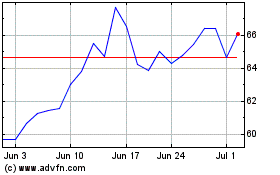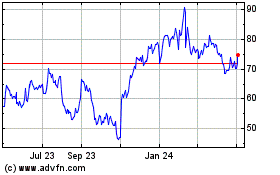By Gunjan Banerji
The revenue warning issued on Monday by Apple Inc. is another
test of investors' long-running love affair with so-called growth
stocks.
For weeks, investors have bet that the giant technology stocks
that have led the market would march on despite the disruption and
economic slowdown in China caused by the coronavirus. They've
continued to put their faith in companies that promise rapidly
increasing profits and revenue.
"Investors believe they're better positioned to weather any
economic storm," said Brent Schutte, chief investment strategist at
Northwestern Mutual Wealth Management Co., speaking of growth
stocks. "Even if there's a recession, people will keep using
Facebook."
Investors could take Apple's warning on Monday that it won't
meet revenue expectations for the current quarter as a sign that
the growth stock run is over. Or they could see the downturn as
temporary and specific to Apple.
Apple was the most vulnerable of the popular tech giants, which
include Microsoft Corp., Amazon.com Inc. and Google parent Alphabet
Inc., because these companies are software and cloud-computer
providers. Apple depends on a sophisticated supply chain that runs
through Chinese factories to produce its physical products,
including the iPhone.
Either way, growth stocks like Apple are vulnerable to a
downturn. The big names are sitting on double-digit gains in 2020
and have powered 45% of the S&P 500's total return, which
reflects price changes and dividend payments, according to S&P
Dow Jones Indices.
The index has set 12 record closes this year as it has risen
4.6%, or 4.9% when including dividends.
The growth rally has been a shift from the fall when value
stocks -- those that tend to trade at low prices relative to their
earnings or net assets -- outperformed growth shares and pundits
predicted their long-awaited rebound had arrived after years of
disappointing returns. Those hopes were buoyed by three
interest-rate cuts by the Federal Reserve that were expected to
spur a rally in bank stocks and other traditional value plays.
Even through periods of turmoil, investors have stuck with
growth stocks. Markets have been rattled even before the
coronavirus outbreak, which has sickened tens of thousands of
people around the world and crimped business activity. The slowdown
pushed oil prices into a bear market and drove investors to
traditionally safer bets like U.S. Treasurys. Before that, there
were tensions between the U.S. and Iran.
Investors appear confident growth stocks can survive these
challenges. Many are eager to hold on to stocks they view as
enduring winners of a period of technology disruption. And despite
their dramatic rally, valuations among tech giants aren't
approaching the levels seen during the dot-com bubble.
As they grapple with a murky outlook, investors will turn their
attention this week to the Fed's latest meeting minutes and fresh
reads on manufacturing. Meanwhile, results from Walmart Inc. on
Tuesday will offer new insight into the health of the consumer.
The run in value stocks "was short lived," said Joe Fath,
portfolio manager for U.S. growth stock strategy at T. Rowe Price.
"There's a number of crosscurrents that are driving what you've
seen."
The MSCI USA Growth index has returned 9% this year, while the
MSCI USA Value Index added 1% through Thursday.
The divergence between growth and value shares has been wide
since the financial crisis. Over the long run, however, value
stocks have earned better returns than their growth peers, and some
investors say it is only a matter of time before growth stocks'
reign ends.
The recent shift has given extra fuel to the market's star
performers and punished shares of financial and energy companies,
which typically are in the value category. Financial stocks have
struggled to keep pace with the broader market this year, rising
just 0.9% in the S&P 500, as yields have dropped in the wake of
the viral outbreak. Higher yields tend to improve banks' lending
profitability.
Meanwhile, the slide in oil prices has hit energy shares. The
S&P 500's energy sector has declined 10.2% this year, the
biggest drop among the 11 groups in the index.
As these sectors have muddled through, big tech companies, which
have become nearly synonymous with growth in recent years, have
continued to stand out. The S&P 500's tech sector is up 11%
this year, leading the way as it has for much of the decadelong
bull run. The enthusiasm has even extended to initial public
offerings including Uber Technologies Inc. and Pinterest Inc. that
made a big splash last year. Though they initially floundered, the
stocks have raced past the broader market, rising 33% and 25%,
respectively, in 2020.
"The market is going to continue to reward these companies,"
said Daniel Morgan, senior portfolio manager at Synovus Trust Co.
"There's still a large appetite for growth."
Mr. Morgan said he recently bought more shares of Amazon ahead
of the company's latest earnings report. The e-commerce giant's
stock is up 15.5% this year, also to near record levels.
Investors say the recent tech run is different from the dot-com
bubble and rooted in corporate fundamentals. However, some point to
rallies in stocks such as Tesla Inc. and Shopify Inc. as a sign of
overexuberance in the market. Tesla's rally has added $69 billion
to its market value this year, while Shopify has gained $16
billion. Neither has ever posted an annual profit.
"It's fear of missing out," said Bill Smead, chief investment
officer of Smead Capital Management, who added he remains
optimistic about value stocks and recently invested in the energy
sector.
Investors who missed out on other big tech companies' gains in
recent years may be hunting for the next favored stock, analysts
said. And as these shares go up and up, they attract investors who
buy stocks simply because they are rising, helping magnify their
gains.
Some still say growth stocks won't keep investors captivated for
long. Many are expecting the Fed's interest-rate cuts to ripple
through the economy, potentially reinvigorating shares of financial
companies and other beaten-down shares.
Mr. Schutte, of Northwestern Mutual Wealth Management, said that
if someone gave him $1 to buy FANG stocks -- the popular acronym
for Facebook, Amazon, Netflix and Google -- or to invest in
everything else, he would "take everything else."
"I think the rally will broaden and things that haven't been
rising as much will rise more in the future," he said.
Write to Gunjan Banerji at Gunjan.Banerji@wsj.com
(END) Dow Jones Newswires
February 17, 2020 20:29 ET (01:29 GMT)
Copyright (c) 2020 Dow Jones & Company, Inc.
Shopify (NYSE:SHOP)
Historical Stock Chart
From Mar 2024 to Apr 2024

Shopify (NYSE:SHOP)
Historical Stock Chart
From Apr 2023 to Apr 2024
